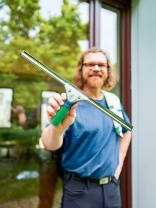Home › magazine › special features › Window cleaning change and responsibility
Window cleaning - change and responsibility
1st of August 2025Like almost all industries, window cleaning and commercial cleaning are closely linked to the general economic situation. Economic fluctuations, digitalisation, the ongoing shortage of skilled workers and uncertain raw material and energy prices all influence market developments.
Since the pandemic, and even before, the requirements of both customers and cleaning professionals have changed. What challenges and opportunities does the industry face today? Stefan Koßmann, digital communication manager at UNGER, writes exclusively for ECJ.
THE DEMAND FOR professional cleaning services has increased significantly in recent years - the pandemic has led to much higher hygiene standards. However, because working from home has become the norm in many companies, the frequency of cleaning in offices is decreasing. Instead, there is growing demand for flexible models.
Facility management companies, for example, are well placed to offer such models with individual complete solutions from a single source, and it is becoming more attractive for customers to outsource cleaning services. Facility management is thus gaining market share.
The overarching trend towards outsourcing services is reshaping competition within the cleaning cleaning industry. Differentiating yourself in the market requires innovative approaches and fresh thinking. For us at UNGER, one of the leading manufacturers of cleaning tools, this presents an opportunity: we have always focused on pioneering work, comprehensive solutions and quality - and we are now leveraging these strengths even more specifically.
Technological developments in commercial cleaning
We are constantly working to improve ourselves. In cleaning tools and pure water filters such as ours, new materials and optimised manufacturing processes are leading to ergonomic improvements that benefit professional users, among other things.
Apart from that, technologies are finding their way into commercial cleaning that are fundamentally revolutionising professional work. In façade and window cleaning - where conventional tools sometimes are not ideal - and in areas that are difficult to access, drones are occasionally used to carry out cleaning. IoT sensors record levels of dirt and fill levels. In addition, cleaning robots and AI-supported applications open up numerous new possibilities for optimising processes and services and using resources in a more targeted manner.
Artificial intelligence is playing an increasingly central role in this. The continuous collection, processing and evaluation of a wide range of building data enables cleaning services to be provided on a needs-based basis, leading to greater efficiency and transparency. For example, AI can use collected data to create customised cleaning and deployment schedules that can be conveniently accessed via an app. It identifies maintenance requirements at an early stage, which helps to prevent downtime. AI is also replacing traditional paper-based checklists with real-time documentation and automated reports, which also help to improve work processes.
Customer expectations in the digital transformation
Digitalisation and technological developments are also reflected in customer expectations. In addition to high-quality results and good value for money, the focus today is on comprehensive service quality, transparent processes and flexibility. Customers expect real-time reports and digital proof - and this also has a significant influence on their choice of service provider.
Most recently, the ‘cleaning on demand’ concept has become established, which responds strongly to actual needs and individual requirements. Here, cleaning only takes place when it is necessary. Hybrid models that efficiently combine manual and automated cleaning are also becoming increasingly successful. In order to offer customers in the window cleaning sector such tailor-made, individual solutions, close cooperation with trade partners and application professionals is extremely important for tool manufacturers such as UNGER.
Staff remain a factor for success
As in all service-dominated industries, a great deal depends on staff in the window cleaning sector. In recent years, the serious shortage of skilled workers has developed into a structural challenge that affects not only individual companies but the entire industry. The shortage of qualified personnel is particularly visible and challenging in specialised tasks such as industrial climbing or maintenance cleaning, which usually have to be carried out daily or several times a week.
Cleaning service providers, who compete not only with each other but also with companies outside the industry for good staff and young talent, have little room for manoeuvre: they have to offer higher wages, excellent working conditions and, if possible, targeted training opportunities. And just as customers today demand a certain level of digitalisation from their service providers, potential candidates also expect this from their future employers.
Whether it’s expertise in the latest cleaning systems or current safety standards, technical understanding is becoming increasingly important, especially in our increasingly automated and digitalised world. Those who can operate modern equipment, handle IoT-based systems and use digital documentation are indispensable. Against this backdrop, a good training programme should not be underestimated as a factor in employee retention.
The industry is becoming increasingly sustainable
In addition to digitalisation, automation and AI, sustainability is the topic that is driving the entire industry. The question of how to reduce the environmental impact of commercial cleaning is one that concerns companies, cleaning professionals and customers alike.
As a manufacturer of window cleaning tools, we at UNGER can reduce the impact on our planet through environmentally friendly cleaning agents, sustainably certified products and more energy-efficient machines, for example. We can also help to reduce our footprint and that of our customers through the continuous development of our product and system solutions.
Cleaning with pure water is now one of the most environmentally friendly technologies for cleaning windows and glass facades. Not only does it clean twice as fast as traditional methods, it also does not require the use of chemicals. Furthermore, pure water cleaning is less physically demanding and more efficient.
Transparency through certified environmental labels
At UNGER, social responsibility is one of the core principles that guide our actions. We take responsibility for the environment and for our products. Like many companies, we are committed to a green cleaning concept, but we also back up our commitment with independent certificates. This demonstrates that our products and solutions are not only efficient, but also specifically reduce environmental impact – without compromising on quality or user-friendliness.
Environmental labels respond to the growing demand for transparency among customers and trading partners and offer clear guidance on the sustainability of a company and its products. Type 1 environmental certificates such as the EU Ecolabel, Cradle to Cradle (C2C) and FSCTM are particularly widely recognised. They are subject to independent testing procedures for ecological quality and provide reliable proof of low environmental impact.
With C2C, for example, the aim is to return all resources to a cycle and thus create a holistic system without environmentally harmful pollutants and waste: the end of a product life cycle also means the beginning of a new cycle. This principle of a potentially infinite circular economy is gaining importance with the concept of eco-effectiveness. Several products from UNGER’s sustainably certified Green Label range for classic window cleaning carry the EU Ecolabel, C2C and/or FSCTM certification.
Looking to the future: innovation is an ongoing task
Window cleaning is undergoing profound change - economically, technologically and socially. Increasing automation, the integration of AI and data-based services, and comprehensive smart building concepts will continue to fundamentally change the scope of cleaning service providers in the coming decades.
Cleaning processes will become more precise, efficient, predictable and data-driven - while conserving resources.This optimisation also places new demands on the qualifications of skilled workers. At the same time, the responsible use of natural resources is becoming increasingly central to corporate strategies: stricter environmental regulations and the desire for demonstrably green services are shaping the development of the industry.
Similarly, demand for new materials, more energy-efficient machines and reusable product solutions will continue to rise.The bottom line: the industry must therefore remain dynamic, willing to learn and forward-looking. Only companies that recognise global trends early on and continuously invest in innovation will not only secure their own competitiveness, but also actively shape the cleaning world of tomorrow.










